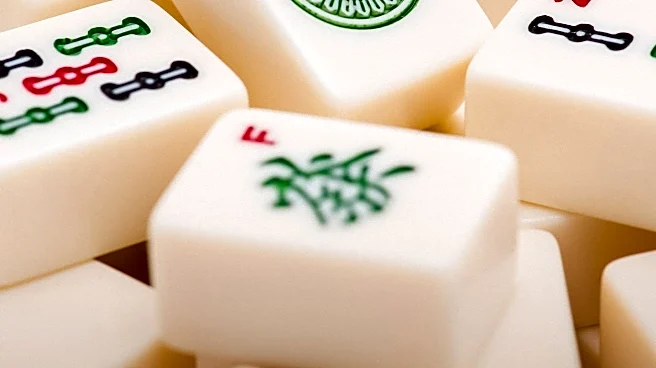What's Happening?
Mahjong, a traditional Chinese tile game, is experiencing a resurgence in popularity among young people in San Francisco. Ryan Lee, a 25-year-old Chinese American, began hosting mahjong nights in his apartment, which quickly grew into pop-up events at local bars, restaurants, and nightclubs. These gatherings, organized by Lee's Youth Luck Leisure (YLL) Mahjong Club, feature up to 30 tables and 200 guests, offering a festive atmosphere with live DJs and custom cocktails. The events attract a diverse crowd interested in socializing offline and connecting with cultural nostalgia. Eventbrite reports a 179% increase in mahjong events in the U.S. from 2023 to 2024, indicating a growing interest in offline activities among Gen Z.
Why It's Important?
The rise in mahjong's popularity highlights a cultural shift among younger generations seeking to connect with their heritage and engage in offline social activities. This trend benefits local businesses, such as restaurants and bars, by drawing in new customers and fostering community engagement. Additionally, it reflects a broader interest in 'grannycore' activities, which include traditional hobbies like baking and needlework. The resurgence of mahjong and similar activities may influence cultural preservation efforts and encourage intergenerational connections within the Asian American community.
What's Next?
The YLL Mahjong Club plans to expand its events to other U.S. cities, following the success in San Francisco and Los Angeles. As demand continues to rise, more venues may host mahjong nights, potentially leading to collaborations with local businesses and cultural organizations. This expansion could further promote cultural heritage and community building across diverse urban areas. Additionally, the growing interest in mahjong may inspire new instructional projects and publications, similar to Nicole Wong's 'The Mahjong Project,' which explores the game's history and strategies.
Beyond the Headlines
Mahjong's popularity among young people may have deeper implications for cultural identity and community dynamics. As individuals seek to reconnect with their heritage, these events provide a platform for cultural exchange and understanding. The trend also raises questions about the commercialization of cultural activities and the balance between preserving tradition and adapting to modern social contexts. Furthermore, the rise of mahjong could influence the development of new cultural spaces that prioritize offline interaction and community building.










